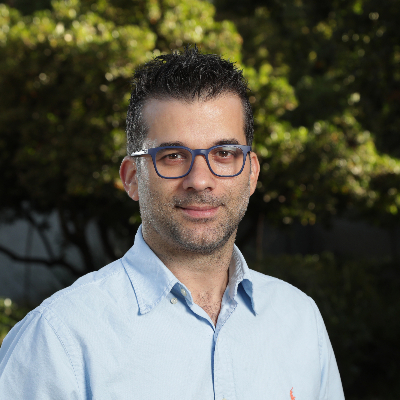
Professor Vasileios Christopoulos has been an assistant professor at the University of California, Riverside since 2019. He obtained his Ph.D. at the University of Minnesota in computer science and a minor in cognitive sciences. After obtaining his Ph.D., he went onto the California Institute of Technology (Caltech) as a postdoctoral fellow to pursue his interest in neuroscience. Currently, he is a part of UCR’s Department of Bioengineering and the Graduate Neuroscience Program, as well as a visiting associate in the Division of Biology and Biological Engineering at Caltech and an Adjunct Clinical Assistant Professor of Neurological Surgery at the University of Southern California’s Medical School.
Christopoulos studies through a neuroscience lens; his lab focuses on the development of the networks of the brain and how they are affected. However, the professor did not always find himself in the biological sciences.
In an interview, Christopoulos shares his life story with The Highlander. He says that “people tend to tell the bright side of their stories, but there is a lot of pain” and “many times that you cry,” which he admits to because he believes that pain and failure are a necessity in the field of science.
His journey began when he was a seventeen-year-old high school student in Greece choosing his future college — as most students here at UCR can relate — it was no easy task. In high school, he already had a dream to “give back to humanity.” However, he states that he did not really know what he wanted to do at this time. He decided to major in mechanical engineering to fulfill his love of math and picked a school in the southern part of Greece because of the area and the fun atmosphere.
When asked about his past, he reflects that he realized as an undergraduate that he needed to develop a strong background in mathematics and programming. He believes such a background is advantageous for any undergraduate student because gaining analytical and computational skills can be applied to any career. At the same time, he does understand that it is not a path everyone can take.
He admits that he wanted to become a physician or a surgeon at first because he wanted to do his part to help society, but he decided to pursue a more math based career because he loves mathematics and computation. He “sacrificed medicine for engineering,” as he says.
Once he completed his undergraduate degree, another heavy decision was put upon him.
Throughout his academic and professional career, Christopoulos has been motivated by the question, “What should he accomplish next?”
When asked about the move to America, he answers, “when I came to the States, I left many things behind: family, friends, my girlfriend at the time. Since I made the decision, I want this decision to feel it’s worth it.”
Thus, he moved across seas to work with people who may have answers. He went to the University of Minnesota to complete his Ph.D. and worked under Professor Apostolos Georgopoulos and Professor Paul Schrater. However, there were times during graduate school when he found himself unhappy in his work. The second year into his graduate program, he knew that robotics was not for him. He found it “miserable,” actually.
He believes that “if you are doing something you don’t like, then what is the point of wasting the most productive time of your life.”
Now, thinking about it, he knows that it is important for him to be interested in his work and research even when out of the lab. If he starts only thinking about his work from nine to five, he knows he must switch his focus to another subject.
Therefore, when he is mentoring his new graduate students, he urges them to communicate what they want to accomplish and what specific direction they want to proceed in. He states that it is “important for me to be very careful because you don’t want to damage these people. I feel very responsible for my students.” He goes on to say that he constantly asks his students if they are happy in his lab because “you have to do what you love here” and firmly believes “you have to be very passionate about your research or there is no way to survive in this environment.”
He lives by his statement, “If the question I have requires skills I don’t have, I am going to get the skills regardless of how much time they will take. I don’t care.” His determination to find answers at any cost motivates him to be a great researcher here at UCR. He believes one of the ultimate goals of research is that when somebody is talking about your field of work, they must bring up your name.
Throughout his lab, he reminds his students that “failure is our friend,” and if they do not fail, it means they are doing something that is not very innovative. To which he follows up with, “And I don’t like things that are not innovative because we’re wasting our time.”
Currently, Dr. Christopoulos has multiple ongoing projects at work. A few of these projects include work on developing functional neuroimaging of the human spinal cord for patients with chronic back pain, understanding deep brain stimulation treatment for schizophrenia and a collaborative study with Elena Kokkoni’s lab, focusing on the developing motor systems of infants and kids.
Christopoulos does not believe that science should only look forward, saying that “there is no way to connect the dots when you move forward; you have to look back to connect the dots. There is no way to see the big picture.”
More information on Dr. Christopoulos’ research or classes can be found on his lab website. He also has numerous publications to learn from.







